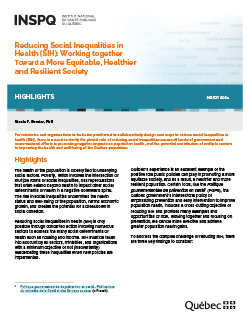Reducing Social Inequalities in Health (SIH): Working together Toward a More Equitable, Healthier and Resilient Society
For ministries and organizations to be better positioned to collaboratively design new ways to reduce social inequalities in health (SIH), there is a need to clarify the pivotal role of reducing social inequalities across all levels of government and cross-sectoral efforts in preventing negative impacts on population health, and the potential contribution of multiple sectors to improving the health and well-being of the Québec population.
Highlights
The health of the population is closely tied to underlying social factors. Poverty, which involves the intersection of multiple forms of social inequalities, has repercussions that often extend beyond health to impact other social determinants of health in a negative downward spiral. The rise in social inequalities undermines the health status and well-being of the population, harms economic growth, and creates the potential for a breakdown in social cohesion.
Reducing social inequalities in health (SIH) is only possible through concerted action involving numerous sectors to address the many social determinants of health such as housing and income. SIH must be taken into account by all sectors, ministries, and organizations with a minimum objective of not (inadvertently) exacerbating these inequalities when new policies are implemented.
Québec’s experience is an excellent example of the positive role public policies can play in promoting a more equitable society, and as a result, a healthier and more resilient population. Certain tools, like the Politique gouvernementale de prévention en santé (PGPS), the Québec government’s intersectoral policy of emphasizing prevention and early intervention to improve population health, includes a cross‑cutting objective of reducing SIH and provides many examples and opportunities of how, working together and focusing on prevention, we can be more effective and achieve greater population health gains.
To address the complex challenge of reducing SIH, there are three key findings to consider:
- Public policies within the health sector that aim to reduce SIH by focusing on lifestyle interventions or improving access to health and social services are often intervening too late. There is therefore a need for more structural, “upstream” and intersectoral approaches, by ministries and organizations outside of the health and social services sector to prevent SIH before these inequalities lead to negative impacts on health.
- The United Kingdom’s vast experience in reducing SIH underscores the importance of complementarity between approaches tailored to the needs of individuals and specific underserved communities and approaches that recognize the central role of population-wide government policies and programs (i.e., social assistance, education programs, etc.).
- Social policies (e.g., on early childhood, housing, social and built environments, etc.) play an essential role in improving health and reducing SIH, much like economic policies (e.g., business and tax policies and those related to income, employment conditions, and the minimum wage). Although actions, policies and programs influencing socioeconomic, cultural, and environmental factors are effective at reducing inequalities, they are more difficult for the health sector to implement on its own, as compared with interventions targeting lifestyle habits or access to health and social care services, which is why these intersectoral partnerships and collaborations are so crucial.
The SARS-CoV-2 (COVID-19) pandemic caused Québec, and governments around the world, to urgently make a number of critical decisions to protect the health and safety of the population and the integrity of their overburdened health system, but these interventions also had inadvertent repercussions on social inequalities and the social determinants of the population’s health. The far-reaching impacts of this crisis will persist in all sectors of government activity for the coming years, and will likely continue to have ongoing impacts on health long after the pandemic is officially declared to be over. The PGPS provides a timely and important opportunity to work together towards an ambitious vision of a Québec society that is more equitable, healthier and more resilient to face current and future challenges (such as the growing threat of climate change which also risks further exacerbating social inequalities).


